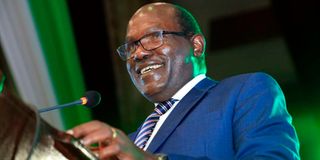IEBC to enforce campaign financing ahead of 2022 polls

Independent Electoral and Boundaries Commission Chairman Wafula Chebukati making his address on June 15, 2021 at Bomas of Kenya during the electoral body's strategic plan.
Politicians intending to run in 2022 had better put their finances in order as the Independent Electoral and Boundaries Commission (IEBC) will be watching.
Commission chairman Wafula Chebukati on Friday said IEBC would enforce the Election Campaign Financing Act, 2013 strictly.
The law, which is meant to regulate campaign finances and level the field for candidates, was suspended for the 2017 elections.
“The attention of stakeholders and the general public is drawn to the Election Campaign Financing Act, 2013, suspended for only the 2017 General Election, now stands in force for the purposes of the 2022 General Election,” Mr Chebukati said in a statement.
Campaign finance accounts
According to the Act, candidates and political parties taking part in the elections will be required to open campaign finance accounts, establish campaign financing-expenditure committees and appoint officials to manage the funds.
These have to be done at least two months to the elections.
According to the campaign spending limits set in 2016, political parties can receive up to Sh15.03 billion in contributions, with a single source limited to Sh3 billion.
Presidential candidates were limited to spending Sh5.25 billion while those contesting the governor, senator and woman representative positions were allowed to spend up to Sh433 million.
An aspiring MP can spend up to Sh33.4 million while a contestant for a ward representative seat was allowed up to Sh10.3 million.
However, these figures were never implemented as MPs suspended the law for the 2017 elections, leaving parties and candidates to splash as much cash as they had to the disadvantage of the less financed ones.
The limits could be reviewed before the next elections.
The statement came as IEBC grows frustrated with the inaction of the Justice Committee of the National Assembly on the Election Campaign Financing (Amendment) Bill, 2020.
Campaign finances
Through the bill, the commission was seeking to restrict campaign finances by requiring authorisation of expenditures to be approved by treasurers, their deputies or an authorised person. Similarly, the proposed amendments would require political parties to ascertain and keep a list of all its donors.
“A political party shall not accept a donation if the donation is not a permissible; or the party is unable to ascertain the identity of the donor,” the bill states.
Permissible donors, the bill states are individuals registered as voters, a registered body corporate carrying on business within Kenya, an unincorporated body of two or more persons which carries on business or other activities wholly or mainly in the Kenya and has its main office in Kenya; and contributions from a harambee.
The bill also sets the limits a single source can contribute to 20 per cent of the total contributions received by a candidate, political party or referendum committee.





